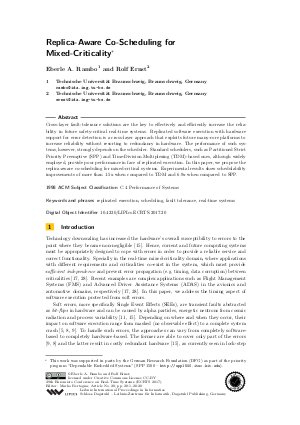Replica-Aware Co-Scheduling for Mixed-Criticality
Authors Eberle A. Rambo, Rolf Ernst
-
Part of:
Volume:
29th Euromicro Conference on Real-Time Systems (ECRTS 2017)
Part of: Series: Leibniz International Proceedings in Informatics (LIPIcs)
Part of: Conference: Euromicro Conference on Real-Time Systems (ECRTS) - License:
 Creative Commons Attribution 3.0 Unported license
Creative Commons Attribution 3.0 Unported license
- Publication Date: 2017-06-23
File

PDF
LIPIcs.ECRTS.2017.20.pdf
- Filesize: 2.13 MB
- 20 pages
Document Identifiers
Subject Classification
Keywords
- replicated execution
- scheduling
- fault-tolerance
- real-time systems
Metrics
- Access Statistics
-
Total Accesses (updated on a weekly basis)
0Document
0Metadata
Abstract
Cross-layer fault-tolerance solutions are the key to effectively and efficiently increase the reliability in future safety-critical real-time systems. Replicated software execution with hardware support for error detection is a cross-layer approach that exploits future many-core platforms to increase reliability without resorting to redundancy in hardware. The performance of such systems, however, strongly depends on the scheduler. Standard schedulers, such as Partitioned~Strict Priority Preemptive (SPP) and Time-Division Multiplexing (TDM)-based ones, although widely employed, provide poor performance in face of replicated execution. In this paper, we propose the replica-aware co-scheduling for mixed-critical systems. Experimental results show schedulability improvements of more than 1.5x when compared to TDM and 6.9x when compared to SPP.
Cite As Get BibTex
Eberle A. Rambo and Rolf Ernst. Replica-Aware Co-Scheduling for Mixed-Criticality. In 29th Euromicro Conference on Real-Time Systems (ECRTS 2017). Leibniz International Proceedings in Informatics (LIPIcs), Volume 76, pp. 20:1-20:20, Schloss Dagstuhl – Leibniz-Zentrum für Informatik (2017)
https://doi.org/10.4230/LIPIcs.ECRTS.2017.20
BibTex
@InProceedings{rambo_et_al:LIPIcs.ECRTS.2017.20,
author = {Rambo, Eberle A. and Ernst, Rolf},
title = {{Replica-Aware Co-Scheduling for Mixed-Criticality}},
booktitle = {29th Euromicro Conference on Real-Time Systems (ECRTS 2017)},
pages = {20:1--20:20},
series = {Leibniz International Proceedings in Informatics (LIPIcs)},
ISBN = {978-3-95977-037-8},
ISSN = {1868-8969},
year = {2017},
volume = {76},
editor = {Bertogna, Marko},
publisher = {Schloss Dagstuhl -- Leibniz-Zentrum f{\"u}r Informatik},
address = {Dagstuhl, Germany},
URL = {https://drops.dagstuhl.de/entities/document/10.4230/LIPIcs.ECRTS.2017.20},
URN = {urn:nbn:de:0030-drops-71529},
doi = {10.4230/LIPIcs.ECRTS.2017.20},
annote = {Keywords: replicated execution, scheduling, fault-tolerance, real-time systems}
}
Author Details
References
-
Björn Andersson and Dionisio de Niz. Analyzing Global-EDF for multiprocessor scheduling of parallel tasks. In International Conference On Principles Of Distributed Systems, pages 16-30. Springer, 2012.

-
Philip Axer. Performance of Time-Critical Embedded Systems under the Influence of Errors and Error Handling Protocols. PhD thesis, TU Braunschweig, 2015.

-
Philip Axer, Rolf Ernst, Björn Döbel, and Hermann Härtig. Designing an analyzable and resilient embedded operating system. In Proc. on Software-Based Methods for Robust Embedded Systems, Braunschweig, Germany, 2012.

-
Philip Axer, Sophie Quinton, Moritz Neukirchner, Rolf Ernst, Bjorn Dobel, and Hermann Hartig. Response-time analysis of parallel fork-join workloads with real-time constraints. In Proc. of ECRTS'13, 2013.

-
Philip Axer, Maurice Sebastian, and Rolf Ernst. Reliability analysis for mpsocs with mixed-critical, hard real-time constraints. In Proc. Intl. Conference on Hardware/Software Codesign and System Synthesis (CODES+ISSS), 2011.

-
Enrico Bini and Giorgio C. Buttazzo. Measuring the performance of schedulability tests. Real-Time Systems, 30(1-2):129-154, 2005.

-
Nathan Binkert, Bradford Beckmann, Gabriel Black, et al. The Gem5 Simulator. SIGARCH Comput. Archit. News, 39(2), August 2011.

-
Björn Döbel, Hermann Härtig, and Michael Engel. Operating system support for redundant multithreading. In Proc. of EMSOFT'12, 2012.

-
Michael Engel and Björn Döbel. The reliable computing base-a paradigm for software-based reliability. In GI-Jahrestagung, pages 480-493, 2012.

- Dror G. Feitelson and Larry Rudolph. Gang scheduling performance benefits for fine-grain synchronization. Journal of Parallel and Distributed Computing, 16(4):306 - 318, 1992. URL: http://dx.doi.org/10.1016/0743-7315(92)90014-E.
-
Rémi Gaillard. Single event effects: Mechanisms and classification. In Michael Nicolaidis, editor, Soft Errors in Modern Electronic Systems. Springer US, 2011.

-
Joël Goossens and Vandy Berten. Gang ftp scheduling of periodic and parallel rigid real-time tasks. arXiv preprint arXiv:1006.2617, 2010.

-
M. R. Guthaus, J. S. Ringenberg, D. Ernst, T. M. Austin, T. Mudge, and R. B. Brown. MiBench: A free, commercially representative embedded benchmark suite. In WWC-4. 2001, Dec 2001.

-
R. Henia, A. Hamann, M. Jersak, R. Racu, K. Richter, and R. Ernst. System Level Performance Analysis-the SymTA/S Approach. IEE Proceedings-Computers and Digital Techniques, 152, 2005.

- Andreas Herkersdorf et al. Resilience Articulation Point (RAP): Cross-layer dependability modeling for nanometer system-on-chip resilience. Microelectronics Reliability, 54(6-7):1066-1074, 2014. URL: http://dx.doi.org/10.1016/j.microrel.2013.12.012.
- M. Hoffmann, F. Lukas, C. Dietrich, and D. Lohmann. dOSEK: the design and implementation of a dependability-oriented static embedded kernel. In Proc. of RTAS'15, pages 259-270, 2015. URL: http://dx.doi.org/10.1109/RTAS.2015.7108449.
-
International Standards Organization. ISO 26262: Road Vehicles - Functional Safety, 2011.

-
Robert Kaiser and Stephan Wagner. Evolution of the PikeOS microkernel. In First International Workshop on Microkernels for Embedded Systems, 2007.

-
Shinpei Kato and Yutaka Ishikawa. Gang EDF scheduling of parallel task systems. In Proc. of RTSS'09, 2009.

-
J. P. Lehoczky. Fixed priority scheduling of periodic task sets with arbitrary deadlines. In Proc. of RTSS'90, 1990.

- NXP MPC577xK Ultra-Reliable MCU Family. [online]. Available: http://www.nxp.com/assets/documents/data/en/fact-sheets/MPC577xKFS.pdf, 2017.
-
John K. Ousterhout. Scheduling techniques for concurrent systems. In ICDCS, volume 82, pages 22-30, 1982.

- J. C. Palencia and M. Gonzalez Harbour. Schedulability analysis for tasks with static and dynamic offsets. In Proc. of RTSS'98, 1998. URL: http://dx.doi.org/10.1109/REAL.1998.739728.
-
Eberle A. Rambo and Rolf Ernst. Providing flexible and reliable on-chip network communication with real-time constraints. In 1st International Workshop on Resiliency in Embedded Electronic Systems (REES), 2015.

-
Eberle A. Rambo, Selma Saidi, and Rolf Ernst. Providing formal latency guarantees for ARQ-based protocols in networks-on-chip. In Proc. of DATE'16, 2016.

-
Eberle A. Rambo, Christoph Seitz, Selma Saidi, and Rolf Ernst. Designing networks-on-chip for high assurance real-time systems. In Proc. of PRDC'17, 2017.

-
K. Richter. Compositional Scheduling Analysis Using Standard Event Models. PhD thesis, TU Braunschweig, 2005.

-
RTCA Incorporated. DO-254: Design Assurance Guidance For Airborne Electronic Hardware, 2000.

-
K. W. Tindell, A. Burns, and A. J. Wellings. An extendible approach for analyzing fixed priority hard real-time tasks. Real-Time Systems, 6(2), 1994.

